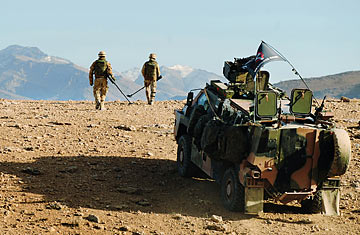
Dutch soldiers check for improvised explosive devices during a patrol in Chora Valley in Afghanistan's southern Uruzgan province
It was always going to be a tough sell for Dutch Prime Minister Jan Peter Balkenende. His government had pledged to withdraw 1,950 troops from Afghanistan by September — but he was going to renege on that promise and try to keep the Dutch contingent in the war zone through this year, flying in the face of Dutch political and public outrage. The result: on Feb. 20, after 16 hours of negotiations with his coalition partners in the Hague, Balkenende's efforts failed and with that came the collapse of his coalition government. New elections are expected within three months, and the Netherlands will now pull its contingent out of Afghanistan by December, leaving a vacuum in the southern Uruzgan province.
The Dutch government's collapse comes less than three months after U.S. President Barack Obama appealed to NATO allies to boost their Afghanistan troop numbers as part of a surge in the central Asian country. NATO asked this month for the Dutch mission to be extended beyond 2010. But Balkenende's coalition partners in the center-left Labor Party had already secured a pledge from the coalition's main party, the Christian Democrats, to pull troops out this year. Despite Balkenende's pleas, the Labor Party refused to reconsider. "A plan was agreed when our soldiers went to Afghanistan," said Labor leader and outgoing Finance Minister Wouter Bos. "Our partners in the government didn't want to stick to that plan and, on the basis of their refusal, we decided to resign."
Balkenende was scathing in his condemnation of Labor, saying it failed to understand the wider implications of an Afghanistan pullout. "When the Netherlands becomes the first and only country to say no to any activities, that will lead to question marks abroad," he said.
The Dutch represent just 2.3% of the 86,000 foreign troops in Afghanistan, but they have the eighth largest national contingent in the country and one of the highest contributions as a proportion of both their population and overall national army. While Uruzgan province does not face a security threat as severe as the threats in Helmand and Kandahar, it is still volatile: 21 Dutch soldiers have been killed since the mission was first deployed in 2006. The deployment was initially scheduled to end in 2008 but was extended by two years because no other NATO member state offered a replacement.
The danger now for the U.S.-led alliance is that the Dutch withdrawal might encourage other nations to draw back from the mission. European nations are growing increasingly hostile to the war in Afghanistan, and many have dragged their feet over Obama's appeals for more troops to join the surge. "Counterinsurgency is also about perceptions," says Nick Grono, deputy president for operations at the International Crisis Group in Brussels. "The Dutch decision creates an impression among both allies and insurgents and makes the NATO effort just a little bit more difficult. It raises questions about other countries thinking about their commitments. At the same time, the Taliban has an effective propaganda effort, and they will play it up as a lack of international resolve."
Balkenende is also worried that the move could damage Dutch influence in groups like NATO and even lose its hard-earned seat at G-20 meetings. Those fears are echoed among analysts. "Our engagement has given us global access," says Christa Meindersma, deputy director of the Hague Center for Strategic Studies. "But that will change now. This decision will make us a less reliable partner for international endeavors."
Polls show strong public backing for a withdrawal and for the Labor Party's stance. But the real victors in the next elections could end up being smaller parties at the fringes of mainstream politics, with polls indicating that the anti-immigrant Freedom Party of Geert Wilders might take second place. Wilders has described Islam as a fascist religion and has called for the banning of the Koran and a halt on immigration from Muslim countries — all policies likely to create new frictions with the Muslim world and even alienate the Netherlands from its European allies. If Wilders were to be part of a future government, it could usher in a crisis of credibility in Dutch politics, says Ko Colijn from the Netherlands Institute of International Relations Clingendael. "The outside world does not understand Dutch politics at the moment," Colijn says. "We will lose credibility on the global stage."
